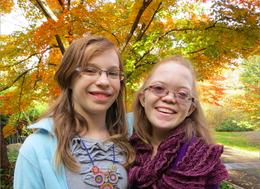Do you and your sister share brainstorming or draw inspiration from similar sources? How do you influence each other’s writing?
Emma: I have always believed that my love of writing stems directly from my sister. When we were younger (and even now) we played constantly. We made up ridiculous scenarios and outrageous characters with the most complicated plots imaginable... My sister has always been the funnier of the two of us, and I’ve watched her taste in humor grow as her characters came up with witty remarks and found themselves in hilarious situations. I know that her monologue contains a few terms from a beauty pageant game we played and the concept of beauty pageants is something we often mock and make parodies of. Hannah: My sister and I constantly influence each other. Its evident most in how we talk, our similar sarcastic humor and funny sayings are definitely really similar and I think that’s something Sarah got from me, and I got from both my mom and by watching too many Disney Channel sitcoms as a child. From reading some of her writing, I know that she puts a lot of our humor into her stories and characters and I love reading it out loud because I can imagine she or I saying it. Have you read your sister’s winning monologue this year? Emma: I did indeed read my sister’s monologue. She asked for feedback before she sent it in and my mom and I critiqued it for her... Giving and receiving feedback is one of my favorite parts of the writing process, which is one of my favorite things about PYP; the amount of feedback it gives writers. I was with her monologue all the way, which makes me all the more excited to see it performed. Hannah: I only recently read my sister’s finished monologue... but I’m actually happy I wasn’t super invested in her monologue because I was really pleasantly surprised how much her writing had improved when I was finally able to read it. Since this is actually Sarah’s second winning monologue, I’m excited to see the differences in how her writing is performed on stage. As part of a crazy theatre household where everyone is constantly editing and advising each other, its nice to step away from a project and just enjoy the final result once and a while. What does being part of the Philly Young Playwrights family mean to you? What are your hopes for your sister continuing to be involved in PYP? Emma: PYP means the world to me and my sister means the world to me, so to have the two together is incredible. PYP welcomed me with open arms and I don’t know how it is for my sister now to have had that door wide open in front of her and only now stepping through it. I hope she can learn as much about herself through PYP as I did and that it will become a safe haven for her to create and explore her imagination. When I go to college my sister will just be entering high school, so I hope she takes my place in PYP if she would like to. Hannah: My PYP experience is one I really appreciated as a middle schooler. It was so rewarding to combine my love of acting and my love of writing and to be in a room full of people who were all so passionate about playwriting. Going through the revision process not only improved my monologue and my writing skills, but my acting. It was so helpful to be on the other side of the table as the playwright and to understand how characters and ideas develop. I think this is a part of the process that my mom, and now my sister, have benefited from as well. Having almost my entire family involved in PYP is really exciting and I admire my mom and sister for having so much dedication. My sister is now a second time winner; she really inspires me to start writing another play or monologue and hopefully get to become a more involved member of the PYP community. Top Six Tips from a winning playwright to her younger sister:
0 Comments
Leave a Reply. |
Categories
All
|
|
This work is licensed under a Creative Commons Attribution-NonCommercial-ShareAlike 2.0 Generic License.
|
|
© Philadelphia Young Playwrights - 1219 Vine Street, Floor 2 Philadelphia, PA 19107
Phone: 215-665-9226 Fax: 215-665-9228 Email: [email protected] |




